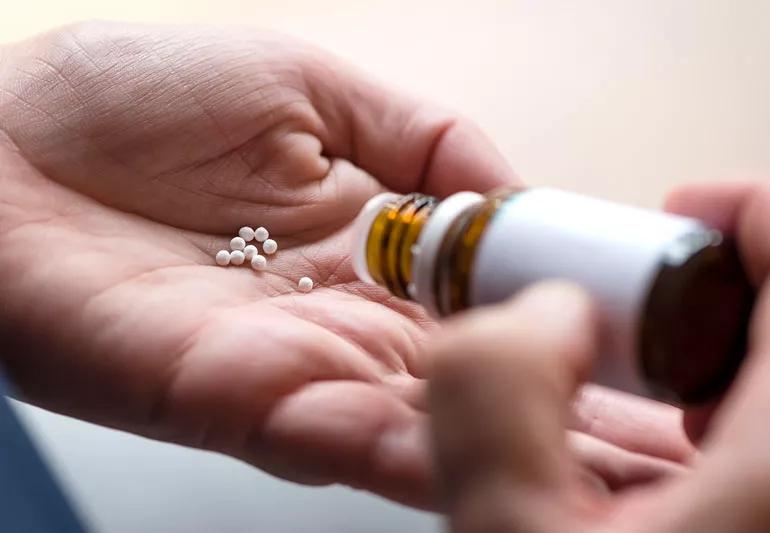This alternative medicine is based on the premise that diluted ingredients will treat symptoms

Image content: This image is available to view online.
View image online (https://assets.clevelandclinic.org/transform/58876657-4914-4862-ac34-9035b6fee24f/homeopathic-Medicine-831212644-770x533-1_jpg)
Person pouring homeopathic pills into palm of hand.
You may have heard about homeopathy. But what is it exactly?
Advertisement
Cleveland Clinic is a non-profit academic medical center. Advertising on our site helps support our mission. We do not endorse non-Cleveland Clinic products or services. Policy
Homeopathy is a system of therapeutics that was developed at the end of the 17th century by Dr. Samuel Hahnemann, a German physician. Homeopathy believes that using extremely minute diluted amounts of plants and minerals can help the body repair itself by promoting healing.
This alternative medicine remains popular worldwide. However, there’s no strong evidence for homeopathy’s effectiveness greater than a placebo.
So, how do you know if it’s safe? And if it works? Integrative medicine specialist Yufang Lin, MD, explains the theory behind homeopathy.
Dr. Hahnemann believed in the natural law of healing — “similia similibus curantur” or “likes are cured by likes.” He thought that a disease could be treated by drugs that have shown to cause symptoms of the disease in a healthy person, but only if a very small dose was used.
“It’s based on this idea of similitude,” says Dr. Lin. “Dr. Hahnemann realized that something in its natural form can cause a specific symptom. He believed that if you take that substance and dilute it, the diluted medicine can treat these symptoms.”
Research has been limited on homeopathy, though. Although there have been some randomized controlled trials comparing homeopathy to placebo, many of these studies are of low scientific quality.
Advertisement
Critics of homeopathy suggest that any results or outcomes are due to the placebo effect, where symptoms may improve although no real medicine was taken. Another criticism of homeopathy is that the medical practice focuses on symptoms instead of treating their underlying causes.
“Intuitively, a lot of people find that homeopathic medicine doesn’t make sense,” says Dr. Lin. “The concept is so unusual that it’s very hard to logically make sense of it.”
Homeopathic doctors, also known as homeopaths, dilute or weaken an ingredient by adding water or alcohol. The product then is shaken, or “potentiated,” to activate its properties. Then, one part of that mixture is diluted with more water or alcohol. This process is repeated until the desired potency is reached.
A common potency or strength of a homeopathic remedy is 200c. That means that one part of the tincture, the extract of the ingredient, is mixed with 99 parts water or alcohol. This process is repeated 200 times. This is a high level of dilution and none of the initial plant-based raw material or mineral may remain in the final tincture.
“Some homeopaths propose that homeopathic remedies work as nanomedicine,” says Dr. Lin. “They believe the original ingredient is broken down through potentization into nanoparticles, even if it’s below the level of detection.”
However, no scientific studies have demonstrated this theory to be true.
For example, poison ivy causes a red, itchy rash. A homeopath would take the poison ivy and dilute it down by going through the potentization process repeatedly. The homeopath would use that treatment to treat the rash.
Some other common ingredients used in homeopathy include:
Homeopaths use their therapies to treat a wide variety of conditions, such as:
To get a better understanding of your symptoms, a homeopathic doctor may ask questions like:
You may also have heard of naturopathy as an alternative medicine system that’s akin to homeopathy. While homeopathy and naturopathy may appear similar, they are, in fact, different.
Naturopathy, also known as naturopathic medicine, combines many different types of treatments. Those methods may include lifestyle changes, herbal supplements, exercise therapy and psychotherapy.
Advertisement
“Naturopathic physicians are trained through a four-year graduate level program and a certified naturopathic medical school,” says Dr. Lin.
However, make sure you do your homework. People may claim to be a naturopath but may have no naturopathic training, as requirements vary from state to state.
According to the National Institute of Health’s 2012 Health Interview Survey, about 6 million people in the United States had used homeopathy in the prior year. A large majority of this use was by individuals choosing and purchasing homeopathic products on their own.
Homeopathic medicine comes in different forms like tablets, gels, liquid drops, creams and sugar pellets. They’re sold in stores or online.
Although most homeopathic medicines are likely harmless, there’s no rigorous evidence that homeopathy is effective for any health conditions. Importantly, despite any marketing that advertises it as an alternative to vaccines, homeopathy should never be used as a replacement for standard immunizations.
If you’re considering taking any form of a supplement, you should speak with a physician first. Homeopathy shouldn’t replace conventional care — so don’t put off a visit to your doctor if you have a medical concern.
Advertisement

Delivered every Tuesday!
Sign up for our Health Essentials emails for expert guidance on nutrition, fitness, sleep, skin care and more
It's a letter about the news!
Learn more about our editorial process.
Advertisement
These terms are becoming outdated as providers turn to an ‘integrative’ approach instead
This supercharged oxygen treatment is unregulated and may do more harm than good
Ayurveda is a 5,000-year-old medical system
Learn about its benefits, uses and side effects, including its ability to turn your skin blue
Both can help reduce pain, but they’re very different in terms of origins, philosophies and practices
Beyond smelling great, essential oils can also help improve your health and mood
Type 2 diabetes isn’t inevitable with these dietary changes
Applying a hot or cold compress can help with pain
Pump up your iron intake with foods like tuna, tofu and turkey